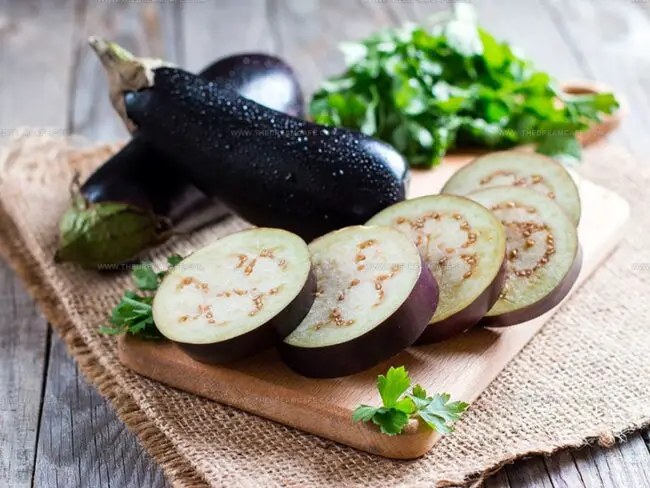What Does Eggplant Taste Like? Uncover This Veggie’s True Flavor
Eggplant flavor remains a culinary mystery for many home cooks and food enthusiasts.
Some people approach this vibrant purple vegetable with hesitation, unsure about its potential on their dinner plate.
Misconceptions and past disappointing experiences often keep individuals from enjoying this versatile ingredient.
Its unique characteristics can transform meals when prepared correctly, offering surprising depth and complexity to numerous dishes.
Chefs worldwide have embraced eggplant in multiple cuisines, demonstrating its incredible adaptability across different cooking techniques.
Understanding its true taste profile requires an open mind and willingness to experiment with various preparation methods.
Your next kitchen adventure might just reveal why this remarkable vegetable has captivated taste buds across cultures.
Dive into the delicious world of eggplant and unlock its hidden potential.
Say Hello to Eggplant
Eggplant is a common part of everyday meals thanks to its tasty flavor and budget-friendly price. If you follow a Paleo vegetarian diet, you’ve likely cooked with it often since it’s used in so many great dishes.
You’ll find eggplant in recipes from all over the world, where it adds a soft, creamy texture and a gentle taste. Even though many people call it a vegetable, eggplant is actually a fruit because it grows from a flower and holds seeds inside.
It has lots of soft pulp and tiny seeds, and its shape can vary depending on the type.
What Makes Eggplant Unique
Eggplant belongs to the same plant family as tomatoes, potatoes, and peppers. Its leaves are large and wide, with tiny hairs on the bottom side.
The flowers are soft in color, usually white or pale purple, with bright yellow centers. Most people recognize the shiny, purple, teardrop-shaped kind, but eggplants actually grow in many colors and forms.
If you explore local markets in different parts of the world, you might spot ones that are oval, long, or thin, with skins that are white, green, pink, orange, or even striped. When sliced open, the flesh inside is mostly white, sometimes with a hint of green or yellow, and filled with clusters of soft beige seeds.
The inside becomes rich and creamy when cooked.
Where Eggplants Come From
Eggplant is one of the most commonly grown crops around the world, mainly harvested for its fruit. In India, it's even considered one of the top vegetables thanks to its nutrition and popularity.
This fruit has been around since ancient times, first appearing in southern and eastern Asia long before it reached Western countries in the 1500s. Its scientific name traces back to a 16th-century Arabic term, while the word “eggplant” comes from a white variety shaped like a chicken egg.
The Taste of Eggplant Demystified
Eggplant brings delicious experiences to many food lovers. Simple flavors make this veggie shine.
Exploring eggplant means understanding its special taste profile through three key parts:
About The Fruit’s Skin
Purple-skinned eggplants have tough, bitter exteriors. White eggplants lack strong taste.
Grilling helps these vegetables become crispy and enjoyable in many recipes.
About The Fruit’s Seeds
Seeds pack the most flavor in eggplants. Eggplant taste comes with a bitter note.
Cooks often sprinkle salt on sliced eggplant pieces before cooking to reduce this bitterness.
Eggplant gender plays a role in its taste profile.
Female eggplants tend to have more bitterness compared to male ones. Females carry more seeds and carry more bitter juice inside.
Modern eggplant farming uses different methods to reduce natural bitterness. Still, some chance remains of picking a bitter eggplant from market shelves.
About The Fruit’s Flesh
Eggplant taste sits somewhere between bland and subtle. Many people find its flavor quite mild.
Removing the bitter liquid helps improve its overall taste profile.
Zucchini comes closest to describing eggplant's flavor.
Both vegetables share a similar mild taste with occasional bitter undertones. Eggplant does have flavor, but it remains quite light.
Blandness becomes eggplant's secret weapon. Chefs love this quality because it allows easy mixing with other strong-tasting ingredients.
Eggplant blends seamlessly into many dishes without overpowering other flavors.
Eggplant works like a kitchen sponge when cooking.
Whatever liquid or oil surrounds it, the vegetable absorbs those flavors completely. Cooking with eggplant means creating super tasty meals through flavor absorption.
Texture matters more than taste for eggplant. Cooked eggplant becomes incredibly smooth and creamy.
Miso paste works wonderfully with its soft consistency.
Eggplant can replace several starchy foods like cornmeal or mashed potatoes.
Its denser texture makes dishes more interesting and substantial. Cooking techniques significantly impact its final flavor and feel.
Essentially, eggplant's mild pulp acts like a flavor chameleon. Preparation method and surrounding ingredients determine its final taste.
Cooking transforms this simple vegetable into something delicious.
Common Types of Eggplant You’ll Find
Eggplants come in many shapes and sizes, and you can group them by how they look:
Eggplants also come in different skin colors like white, pale yellow, or light green, but the flavor stays pretty much the same no matter the color.
How Eggplant Varieties Differ
Thanks to modern farming, we now have three main types of eggplant to choose from based on our taste and cooking needs. But if you're wondering which one stands out when it comes to flavor and health perks, let’s take a quick look at how they compare.
How It Tastes
Long eggplant boasts delicate skin and high water levels, creating a smooth inside perfect for steaming or making sauce. Round eggplant carries thicker skin with less moisture, working well for frying or slow cooking at high heat.
Medium eggplant sits between these two varieties, balancing water content and inner texture from long and round types.
Cooks can prepare medium eggplant through many methods, producing tasty meals.
Because its flavor mimics long eggplant, steaming or sauce preparation suits this type best.
Nutrition Information
Nutritional differences exist between eggplant types. Long eggplants might have slightly more:
Round and medium eggplants typically have lower levels of:
Small nutritional variations mean little in overall eggplant health benefits.
People can choose eggplant types without worrying about minor nutrient differences. Picking an eggplant based on personal preference or recipe needs works best.
What’s in Eggplant Nutritionally
Eggplant is known for being packed with nutrients while staying low in calories. It’s a great source of fiber, vitamins, and minerals, making it a healthy choice for everyday meals.
In every 82 grams of raw eggplant, you get:
It also provides smaller amounts of other nutrients like niacin, magnesium, and copper.
(Source: Healthline.com)
Eggplant’s Health Perks Explained
Eggplant has a unique look, but its real value goes beyond appearance. It offers some surprising health benefits you might not expect, so let’s take a closer look at what this fruit can do for your body.
High Iron And Calcium Content
Eggplants pack powerful health benefits through their rich calcium and iron levels. Medical experts recognize these nutrients as key helpers for blood flow and brain health.
Baking eggplant creates a unique meal that boosts important mineral intake. People can mix this vegetable into several dishes like:
Lowers Heart Disease Risk
Eggplant supports heart and blood health in powerful ways. Inside this purple vegetable sit important compounds that shield you from heart problems and help blood vessels work well.
Packed with key nutrients like vitamin C, vitamin B6, and potassium, eggplant delivers strong protection for your heart. Such a simple food offers big health benefits for your daily meals.
Helps Control Blood Pressure
Eggplant works wonders for human health beyond lowering bad cholesterol. Its flesh and skin pack powerful flavonoids that calm stress levels and help keep blood pressure steady.
Packed with vitamin P, eggplant stands out among vegetables. This special vitamin boosts blood vessel flexibility and cuts cholesterol.
People who eat eggplant might protect themselves from high blood pressure and hardened arteries.
Keeps Blood Sugar Steady
People who eat curry daily show lower blood sugar compared to those avoiding this spice mix. Medical studies point to interesting health benefits from regular curry consumption.
Scientists discovered curry helps improve blood movement through the body. Antioxidants inside curry work to support better circulation.
This makes curry helpful for people worried about blood vessel health.
Manages Healthy Weight
Eggplant works wonders for people struggling with weight management. This vegetable contains minimal calories and zero fat, while providing enough fiber to keep you satisfied between meals.
Stomach digestion slows down with fiber, which helps control hunger signals. Smart cooking methods can turn eggplant into a helpful partner for weight loss goals.
Fiber also supports healthy digestion by encouraging intestinal movement and quickly removing waste from the body. Adding eggplant to daily meals supports smooth digestive system functions and reduces risks of colon-related health problems.
Boosts Brain And Blood Flow
Eggplant contains special plant chemicals that help blood move better to your brain, which makes brain circulation stronger and healthier. Nutrients are mostly found in eggplant skin, so people should clean and cook the whole vegetable to keep all good health benefits.
Purple color on eggplant skin holds a powerful antioxidant called anthocyanin. This substance fights harmful molecules that damage brain cells.
Eating eggplant can boost brain performance, improve thinking skills, and support memory strength.
Smart Tips for Buying Eggplant
Cooking delicious dishes and getting full nutrition from eggplant starts with picking the right one.
Seeds make eggplant taste bitter. Finding eggplants with fewer seeds matters. Cutting through helps, but that's not always practical.
One secret trick involves checking eggplant stems. Round stems mean male eggplants, which have fewer seeds compared to female eggplants with longer stems.
When selecting eggplants, feel their weight. Good eggplants should feel firm and solid in your hand. Picking seasonal eggplants ensures better and sweeter flavors.
Look for smooth skin without wrinkles or dark spots. Fresh stems attached to fruit bodies signal younger, tastier eggplants.
Identifying ripe eggplants takes practice. Press gently with fingers - ripe eggplants will show light marks. Avoid eggplants with hard bodies and pinkish-purple or light purple outer skin.
These simple tips help you choose perfect eggplants for delicious meals.
Easy Ways to Prep Eggplant
Eggplant lovers want to know secret tips for making this veggie taste amazing and stay healthy. Here's how to prepare eggplant perfectly:
Tasty Dishes That Use Eggplant
Eggplant dishes offer countless delicious possibilities because of its unique texture.
People can use eggplant in many different ways:
Some recipes work best with eggplant skin intact, while others require peeling the pulp. Eggplant adapts easily to different cooking methods and recipe needs.
Baking brings out eggplant's best qualities. Grilled eggplant develops a crispy exterior with a creamy center and rich umami flavor. Its smooth texture makes an excellent complement to lasagna.
Moussaka showcases eggplant in Greek cuisine, featuring a similar creamy texture to lasagna. American kitchens often prepare eggplant parmigiana as a popular dish.
Ratatouille combines eggplant with other mild vegetables in a classic French stew. Aromatic herbs enhance the overall flavor profile.
Eggplant's light and neutral taste makes it incredibly versatile. Cooks can experiment with this ingredient in almost any recipe, creating unique and delicious meals with endless possibilities.
Keeping Eggplant Fresh and Firm
Eggplant spoils quickly and needs careful storage. Storing this vegetable requires specific methods to keep it fresh and tasty.
Most people think refrigerators are best for storing eggplant. Storing eggplants in cold spaces used to be my personal practice. Placing them in freezer or cool compartments seemed logical.
Experts suggest different approaches. Storing eggplant at room temperature actually helps maintain its quality and extends its life span.
Smart storage methods include:
Eggplants are delicate vegetables. Cold temperatures below 10 degrees Celsius harm their texture and flavor. Temperatures under 5 degrees create serious problems:
Another important storage tip involves avoiding certain fruits. Eggplant reacts badly to ethylene, a natural gas that speeds fruit ripening. Keeping eggplant away from these ethylene-producing fruits is crucial:
Proper storage helps eggplant stay fresh and delicious for longer periods.
Quick Facts Before You Eat Eggplant
Eggplant has solanine, a substance with both good and bad effects. This chemical can fight cancer cells and help with antioxidants, but it also stimulates breathing centers and may cause anesthesia.
Eating too much eggplant might lead to poisoning. Solanine does not dissolve easily in water, so boiling will not completely remove this substance from the vegetable.
Cooking methods can help reduce solanine levels. Adding a bit of vinegar while processing can break down this chemical. Experts warn against drinking raw eggplant juice because it could cause poisoning.
Interestingly, eggplant contains more nicotine than other fruits. Health experts recommend eating eggplant only 2-3 times per week, consuming about 100-200g each time. This approach helps provide nutrients while keeping you safe from potential harmful effects.
When You Should Avoid Eggplant
Eggplant might seem healthy, but certain people need to watch out for potential health risks. Some medical conditions can be negatively impacted by consuming this vegetable:
Eggplant Flavor and FAQs Answered
1. Is it okay to eat eggplant that tastes a little bitter?
Yes, it’s safe to eat bitter eggplant. Some types are naturally a bit bitter, but eating them won’t harm you. If the taste bothers you, there are easy ways to make it milder.
2. What can I do to remove the bitterness from eggplant?
One of the best tricks is to sprinkle sliced eggplant with a little salt and let it sit for about 30 minutes. The salt helps draw out the bitter juices, making the flavor smoother.
3. How do I know if my eggplant will taste bitter?
Bitter eggplants often feel heavy for their size, have a big green cap, or contain lots of seeds inside. Choosing lighter, younger, or smaller eggplants can help avoid too much bitterness.
4. Does every eggplant taste the same?
Not really! Some eggplants are milder and almost sweet, while others have a stronger, more bitter flavor. Smaller varieties and those with fewer seeds tend to be less bitter.
5. Do I need to peel eggplant before cooking?
No, you don’t have to peel it—eggplant skin is edible and softens as it cooks. For larger or older eggplants, the skin can be a bit tough, so you can peel it if you like.
6. What are easy ways to cook eggplant?
Eggplant is very versatile! Try roasting, grilling, baking, or even stir-frying it. It soaks up flavors and works well in dishes like curries, pasta, and stews.
7. How should I pick a good eggplant at the store?
Look for eggplants that feel firm, have shiny, smooth skin, and are free from brown spots or bruises. A fresh eggplant should also feel slightly heavy for its size.
8. How do I store eggplant at home?
Keep eggplant in a cool, dry place and use it within a few days. You can store it in the fridge, but try to use it soon for the best taste and texture.
Grab Some Eggplant While You Can!
Eggplants are delicious and simple cooking ingredients! Shoppers can easily find this common vegetable that offers excellent nutrition. Home cooks can expand meal options with wonderful eggplant recipes.
Learning to enjoy eggplant requires some helpful tips and creative approaches. Helpful information can guide people through making tasty dishes. Meal planners can expand recipe choices with eggplant-based meals.
Preparing eggplant is straightforward and provides significant health benefits. People love its smooth, rich texture and quickly become fans of this special vegetable. Cooks appreciate how well eggplant blends into many different recipes.
Start experimenting with eggplant right away! Trying new ingredients means exciting kitchen adventures. Sharing recipe discoveries brings joy to cooking friends and family members!




